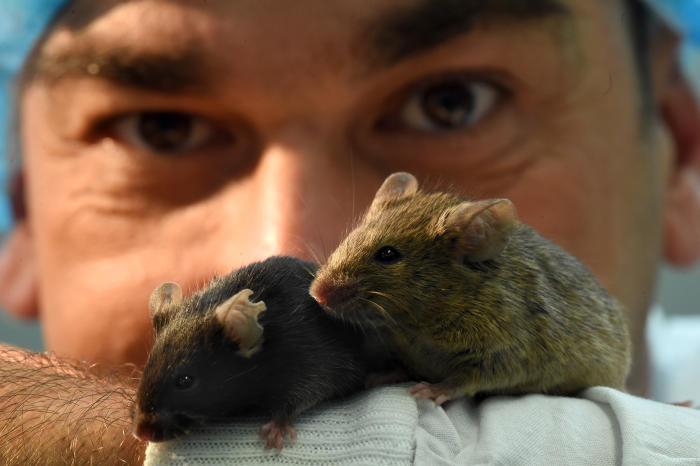
Nonsense was my reply on the ABC news tonight.
Unfortunately, this sort of research gets into mainstream news and hammers something which is showing benefits for real people – not mice.
I have been able to reply to this University of Melbourne research on tonight’s ABC news report. We’ll see how much I have been edited in or out. At least the opportunity to respond was given.
The study looked at the effect of an extreme diet on 9 obese mice and then has the gumption to extrapolate that to say Paleo makes you fat. The word Paleo NEVER appears in the article.
They took 18 mice that are genetically predisposed to obesity and 9 of them were fed a chow mix that was 6% straight sugar, 13% protein and 81% fat. I repeat, 81% fat in a chow form. That is about as far away as you can get from eating real food which is naturally lower in refined sugar and carbohydrate.
Where are the green leafy vegetables, pasture fed meats and healthy fats from nuts, cheese and avocado?
The weight changes were not even documented in the paper. They only referred to percentage changes in ‘Gonadal Fat Pads’. The paper makes no mention of a 15% increase in body weight for these mice. The Melbourne University press release is a sham. Either that or I am reading the wrong article.
I am all for recommending a lower carbohydrate and higher healthy fat lifestyle and will continue to do so. I do not advocate an extreme diet that is anywhere near the percentages and composition thrown out by this study.
Low Carb and Healthy Fat living does work in diabetes management. Every person I know who adopts it has an improvement in their blood glucose control, a reduction in their medications, less hypoglycaemic events and most are losing weight.
This scaremongering by the press release from Melbourne University is just nonsense.
Here’s 12 good points of evidence to consider low carb as the first approach to treating type 2 diabetes and as the most effective adjunct to pharmacology in type 1.
1. Hyperglycemia is the most salient feature of diabetes. Dietary carbohydrate restriction has the greatest effect on decreasing blood glucose levels.
2. During the epidemics of obesity and type 2 diabetes, caloric increases have been due almost entirely to increased carbohydrate.
3. Benefits of dietary carbohydrate restriction do not require weight loss.
4. Although weight loss is not required for benefit, no dietary intervention is better than carbohydrate restriction for weight loss.
5. Adherence to low-carbohydrate diets in people with type 2 diabetes is at least as good as adherence to any other dietary interventions and is frequently significantly better.
6. Replacement of carbohydrate with protein is generally beneficial.
7. Dietary total and saturated fat do not correlate with risk of CVD.
8. Plasma saturated fatty acids are controlled by dietary carbohydrate more than by dietary lipids.
9. The best predictor of microvascular and, to a lesser extent, macro-vascular complications in patients with type 2 diabetes, is glycemic control (HbA1c).
10. Dietary carbohydrate restriction is the most effective method (other than starvation) of reducing serum triglycerides and increasing high-density lipoprotein (HDL).
11. Patients with type 2 diabetes on carbohydrate-restricted diets reduce and frequently eliminate medication. People with type 1 usually require lower insulin.
12. Intensive glucose lowering by dietary carbohydrate restriction has no side effects comparable to the effects of intensive pharmacologic treatment.
http://www.sciencedirect.com/…/article/pii/S0899900714003323
http://www.nature.com/nutd/journal/…/n2/full/nutd20162a.html
https://pursuit.unimelb.edu.au/arti…/paleo-diets-weight-gain
Thank you Gary for bringing some real science and real logic to this debate. As you know, rats and mice in the wild live on a diet that is naturally higher in carbohydrate and very low fat. They will gain excess fat and develop metabolic problems when they are placed on extreme diets (for a rodent) that are very high in fat and low in carbohydrate. Laboratory rats used for experimental purposes are usually fed rat chow which resembles the composition of the diet they would eat in the wild. Feeding rats a diet that is high in fat and low in carbohydrates to assess what might happen in humans is fraught with problems and will draw erroneous conclusions. There are many published papers that attest to the problems associated with using rodent research to advice on diets for humans. These researchers should know better and they need to go back to back to school to learn how to properly design a research study.
Hi Gary,
Your reply to this study on the ABC news was a little over edited, I fear – no time for nuanced argument there! I agree that this study was just scaremongering. Sadly , it may discourage some people who should, from looking further into LCHF.
I don’t necessarily agree that the proportion of the diet were too far out, after all, a diet that is say, ~ 15% protein, ~5% carbs would be not too extreme (IMO) and would still allow ~80% fat. But I do think that the composition of the diet in this study has turned out, by chance or design, to give the current result.
As my favourite blogger (Peter from Hyperlipid (http://high-fat-nutrition.blogspot.com.au/) says, and here I am assuming that NZO mice are similar to
the below mentioned version of Black 6’s:
“when you see a C57Bl/6 mouse get fat on a high fat diet, you know there are lots of double bonds in that fat……..”
(~by my calculations, about 8% by weight in the diet of PUFA for the fatties, vs ~1.5% of PUFA for the controls – and they think this doesn’t have an affect – hmmm).
The inclusion of ~6% by calories of sugar is another issue.
And I for one would not consider eating a diet containing casein as my only protein source. Pity the poor mice – still they only had to eat it for 9 weeks!
Keep up the good fight,
V
Most of my response was edited out Vicki. Welcome to the media 🙂